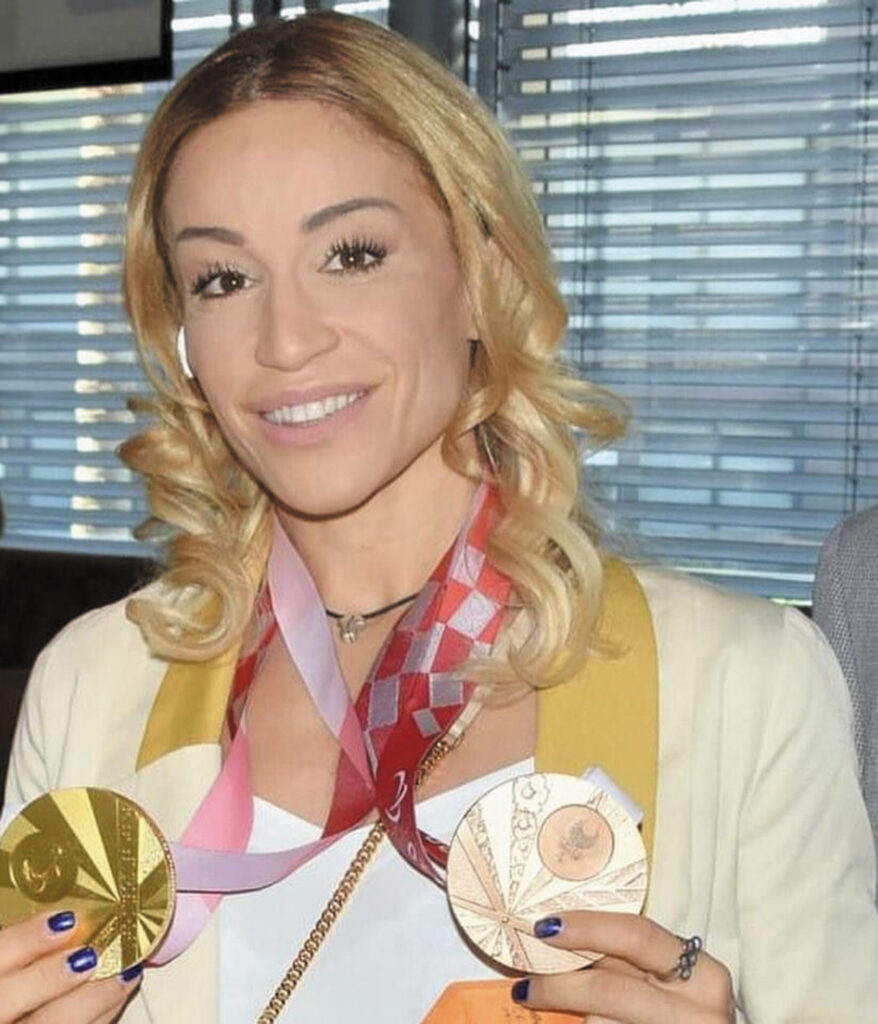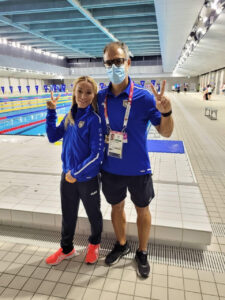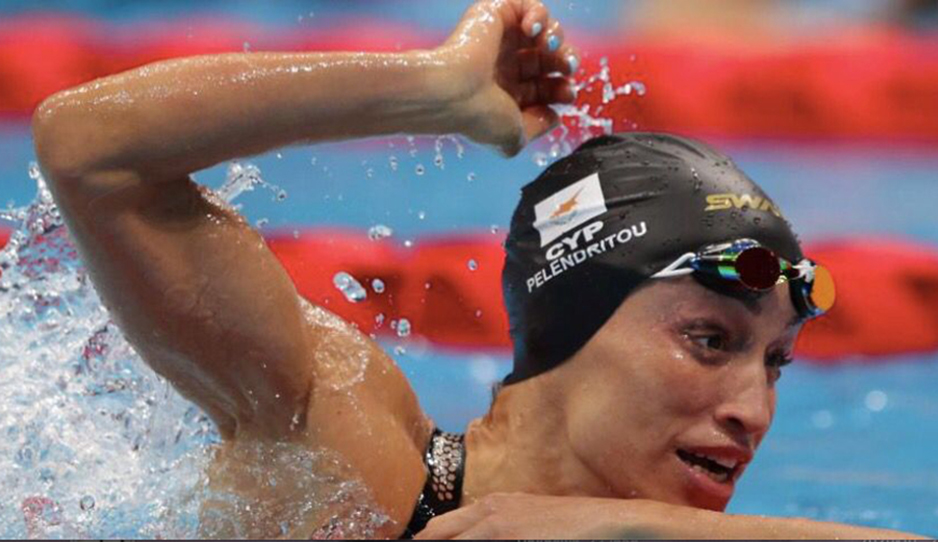With her vision 97 per cent impaired, stress follows Karolina Pelendritou every moment of her waking life, but she tells THEO PANAYIDES she has transformed what should be negative energy into phenomenal success
How embarrassing – or potentially embarrassing. I’m on a Zoom call with champion swimmer Karolina Pelendritou in Greece (she lives in the northern suburbs of Athens), but she doesn’t have her camera on. I ask if she can turn it on, and start to explain why I feel it’s important to be able to see the other person – but hurriedly stop in mid-sentence, mortified at having started off with such an obvious faux pas. She, after all, can’t see the other person, indeed she can’t see much of anything, her vision being impaired by around 97 per cent – but that hasn’t stopped her from winning six medals (three gold, one silver, two bronze) at four different Paralympic Games, breaking 19 world records along the way.
I needn’t have worried: Karolina is completely immune to embarrassment when it comes to her disability, having long since come to terms with it. Like most top athletes, she’s an easy interview – both because she’s done so many, having been in the spotlight since winning her first gold at Athens 2004, but also because you can ask her anything, it’s part of her character. The difference between a gold medal and fourth place is mental strength – and mental strength comes, in part, from being brutally honest with oneself, facing down uncomfortable truths and coming out stronger.

In the annals of impossible questions, the secret ingredient behind Karolina Pelendritou’s success is especially hard to determine. She is, according to Wikipedia, the first living person to appear on a Cypriot stamp (in 2004), and it’s not surprising; her six medals over 17 years are remarkable, especially when you consider that our sole success in 41 years of the able-bodied Olympics is the silver medal won by Pavlos Kontides in 2012. Karolina, representing Cyprus – a country of under a million people – won gold in the Women’s 100m Breaststroke (SB11 category) in Tokyo this year; the runner-up was Ma Jia from China, a country of over one billion people. Yes, there’s a strong team behind her (“Psychologist, nutritionist, gymnast, chiropractor, physiotherapist, my coach…”), but all athletes have strong teams at her level. There has to be something more, but what?
It’s tempting to assume that she must be naturally very positive – but the answer, paradoxically, may be the opposite, viz. that she’s naturally negative but has learned (slowly, painfully) to channel that negative energy and transform it into an asset. How does one actually channel stress? “What you have to do, basically,” she explains, “is that it shouldn’t be panic stress, the kind where you just feel paralysed and sit around unable to do anything. There’s also creative stress – and of course there’s a very thin line between the two – where you realise what exactly is happening, you accept it, and you try to operate in a particular way. But it’s very important, first and foremost, to accept a situation.”

The problem, in those early-teen years, was accepting her disability – a shameful blemish for a lifelong perfectionist like herself. For years, she went to inordinate lengths to disguise her impairment from other swimmers (her vision wasn’t as impaired at the time, admittedly): “If I was going to a medal ceremony,” she recalls, “I’d go earlier so I could see where the podium was, where I’d have to walk to, so they wouldn’t know what was going on”. Maybe if she lived in a bigger place she’d have been more able to accept it, muses Karolina, but “in Cyprus there wasn’t – and unfortunately still isn’t, to a large degree – an acceptance of people who are disabled, or different more generally”.
Was she depressed, at the time?
“It wasn’t exactly depression, I was just very withdrawn. I went into my shell in general, I didn’t have friends, I withdrew – and I devoted myself to my sport because that was somewhere where I didn’t have to explain myself too much. I just had to swim, and train, and be fast. I didn’t have to do anything more.”
The doctors didn’t tell her, at nine, that her eyesight would keep getting worse (maybe they weren’t sure themselves) – but in fact she’s had two periods when her vision deteriorated markedly, first around the age of 20 (by which time she was already in Athens) and then again in the past three years, adding one more uncomfortable truth to be faced and accepted. She competed in the SB13 category in Athens in 2004, but that had shifted to SB12 – a higher level of impairment – four years later in Beijing, and SB11 in Tokyo. Karolina and her husband Demetris also welcomed a new addition to their family recently: Liberty, a guide dog who helps her get around when in public.
That’s why Tokyo was special, perhaps her most special Paralympics (though of course Athens comes close, bursting on the world stage at 18 and winning her and Cyprus’ first-ever gold). It wasn’t just Covid, a year without swimming events and a curiously muted, delayed Games, it wasn’t even the fact that her eyesight had deteriorated – it was also her age. Karolina turned 35 in August, days before winning gold in the 100m breaststroke (she also won bronze in the 50m freestyle); Ma Jia, the aforementioned Chinese runner-up, was 23, and Yana Berezhna, the Ukrainian swimmer who came third, was 24. “I’ve seen off three generations of athletes, at least!” she laughs. She’s the Serena Williams of Paralympic swimming – and, as with Serena, her competitive edge seems quite fierce. I wonder if she feels a secret bond with other athletes (they’ve all had to deal with the same problem, after all), but poolside relations are apparently quite formal. Are most of her friends fellow swimmers? “No,” she replies with another laugh. “And I don’t think they could be, to be honest.”
It’s an interesting point about disabled athletes. Being an Olympian takes dedication, of course, but it’s relatively straightforward: if you’re great at swimming, and you love it enough to work hard, then you’ll probably make it. Being a Paralympian, however, requires something more – a certain stubbornness and cantankerousness, a need to succeed despite one’s body rather than because of it. It’s hard to say in Karolina’s case, since she was already winning races pre-Paralympics – but it’s possible that she wouldn’t have achieved quite so much as an able-bodied athlete; that the difficulties of her daily life, her bouts of anxiety and insecurity, work as a springboard to propel her even higher, her perfectionism seeking to dispel that anxiety by winning gold medals.
What’s the hardest part of daily life? “For me it’s a constant difficulty,” she replies matter-of-factly, “a constant battle. Right from the moment I get up – the process of choosing my clothes, which of course is slower [because] I can’t tell the colours apart. Fixing breakfast, until I find everything – which someone else would do in no time, for me it takes longer. The fact that I don’t drive, so I have to rely on others – on a taxi which might be late, or not arrive at all. Finding the simplest things around the house – my mobile, where is it?… It’s a constant situation that just makes you tired, because you’re always looking for this, trying to do that.”
All this isn’t said to evoke pity (nothing makes her madder than other people’s pity), merely to show how she experiences the world – as a constant source of stress, alleviated only by grounding herself in the moment, the here-and-now. It’s tempting to add ‘except for swimming’ – but in fact swimming too is part of the stress, the process of transmuting negative energy into positive being difficult, “often impossible, I mean the mental pressure is just incredible. You feel that you’ve spent all these years working for a race that’s a minute, maybe two minutes long, and all it takes is for one detail to go wrong – maybe you haven’t slept well the night before or whatever, maybe the trip tired you out, or you’re feeling unwell if you’re a woman, or you’re under the weather – there’s a thousand things that could happen and it all goes wrong”. Karolina’s tone remains matter-of-fact, not the tone of someone complaining but the tone of a chair-maker describing how chairs are made: this is her job, to handle all that pressure just a tiny bit better than the other seven women around her.
That strong will, I venture – feeling a bit embarrassed again – that perfectionism: does it also make her a bit inflexible in personal relationships?
“Well, I wouldn’t say ‘inflexible’. But certainly, a person at the top of their field – in whatever field – is going to have some character traits which, quite often, the average person doesn’t have. So maybe they won’t be able to have many contacts and personal relationships, just because the philosophies aren’t compatible. I mean, if someone’s philosophy is just ‘Go to work, come home’, as a civil servant, but someone else wants to be at the top of the world – well, clearly they don’t have the same desires, the same life goals. So the number of people you’re able to hang out with – or who understand you – is kind of limited… Generally speaking, I don’t believe you need to have lots of friends and acquaintances.” So how many good friends does she have? Maybe 10? “Fewer!” she replies, laughing wryly.
Demetris understands her, being a well-known sports journalist who knows what it takes to succeed as a sportsperson (they married in 2018, having been together for years) – though they don’t have much of a social life, admits Karolina; both work long hours and she can’t stay up very late, especially these days. (The need to rest the body after every exertion is the main drawback to getting older.) So what does she do to unwind? Listen to music, above all – though not just to unwind, also during warm-up and to motivate herself in general. She singles out a song by Giorgos Dalaras, ‘To Pepromeno’ (‘Destiny’), which includes this significant line: “While you’re asleep, someone else is writing history”.
Karolina Pelendritou has that urge, all right, the itch to write history while the rest of us are sleeping – not just by winning races but also campaigning for the rights of the disabled, her aim being for people to accept disability just as she herself worked to accept her own disability. She thinks more should be done to prevent the marginalisation of the disabled in Cyprus, and is scathing about sports authorities (she doesn’t name names) who haven’t – she believes – sufficiently appreciated the enormity of her own achievements, implicitly because they took place in the Paralympics instead of the Olympics.
She has a point; then again, this level of achievement is something of a one-off. She hasn’t won six medals and broken 19 world records because she’s disabled, but because she is who she is – a strong-willed, highly-strung person with iron discipline. What matters, admits Karolina, when the race is about to start and the eight women jump into the pool in their dark glasses, is partly experience and partly preparation – but what really matters is mental strength, “what psychological state you find yourself in… What matters is how much you want it. Everyone wants it, but someone wants it just a little bit more”. She is that someone, and isn’t embarrassed to say so.







Click here to change your cookie preferences